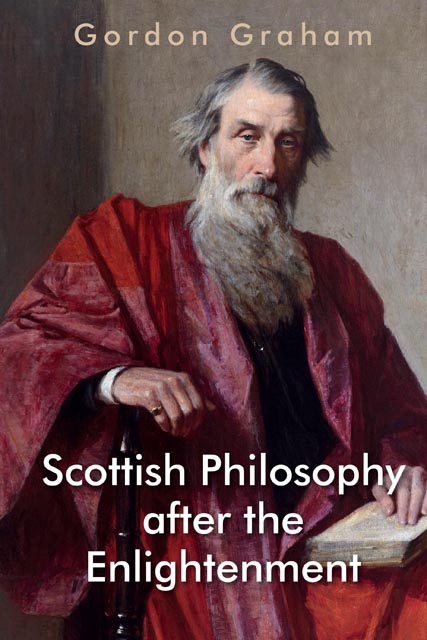Book contents
- Frontmatter
- Contents
- Preface and Acknowledgements
- Series Editor’s Introduction
- A Note on Women in Scottish Philosophy: Mrs Oliphant
- A Chronology of Scottish Philosophy after the Enlightenment
- 1 An Autobiographical Prologue
- 2 Sir William Hamilton and the Revitalisation of Scottish Philosophy
- 3 James Frederick Ferrier and the Course of Scottish Philosophy
- 4 Psychology and Moral Philosophy: Alexander Bain
- 5 Thomas Carlyle and the Philosophy of Rhetoric
- 6 Hegelianism and its Critics
- 7 Scottish Philosophy’s Progress
- 8 Religion, Evolution and Scottish Philosophy
- 9 The Gifford Lectures and the Re-affirmation of Theism: Alexander Campbell Fraser
- 10 The Culmination of Scottish Philosophy: A. S. Pringle-Pattison
- 11 John Macmurray and the Self as Agent
- Bibliography
- Index
2 - Sir William Hamilton and the Revitalisation of Scottish Philosophy
Published online by Cambridge University Press: 07 June 2023
- Frontmatter
- Contents
- Preface and Acknowledgements
- Series Editor’s Introduction
- A Note on Women in Scottish Philosophy: Mrs Oliphant
- A Chronology of Scottish Philosophy after the Enlightenment
- 1 An Autobiographical Prologue
- 2 Sir William Hamilton and the Revitalisation of Scottish Philosophy
- 3 James Frederick Ferrier and the Course of Scottish Philosophy
- 4 Psychology and Moral Philosophy: Alexander Bain
- 5 Thomas Carlyle and the Philosophy of Rhetoric
- 6 Hegelianism and its Critics
- 7 Scottish Philosophy’s Progress
- 8 Religion, Evolution and Scottish Philosophy
- 9 The Gifford Lectures and the Re-affirmation of Theism: Alexander Campbell Fraser
- 10 The Culmination of Scottish Philosophy: A. S. Pringle-Pattison
- 11 John Macmurray and the Self as Agent
- Bibliography
- Index
Summary
I
It is widely agreed that eighteenth-century Scotland was remarkable for its philosophical fertility. From the early years of the century almost to its close, a line of notable philosophers engaged each other in debate on many of the main topics of philosophy, and in the course of it wrote books that have remained important texts in the history of the subject. The philosophers were not alone. They were simply the most prominent group within a larger community of intellectuals engaged in social, historical, literary and scientific inquiry.
For the most part, this intellectual activity took place in three locations, and centred on four small university colleges – two in Aberdeen, one in Edinburgh and another in Glasgow. (Scotland’s most ancient university – St Andrews – seems to have played little part in this intellectual ferment.) For most of the century, the University of Edinburgh was renowned for its medical sciences, while Aberdeen and Glasgow were especially notable for their philosophical prowess. In Aberdeen George Turnbull and George Campbell at Marischal College, and then Alexander Gerard and Thomas Reid at King’s, set philosophical inquiry in new directions. In Glasgow, Francis Hutcheson assumed the Chair of Moral Philosophy in 1726. His student Adam Smith later occupied the same Chair, in which he was succeeded by Aberdeen’s Thomas Reid. Though Hutcheson was venerated as the ‘Father’ of this remarkable line, it was Reid who came to be identified as the founder of a distinctive philosophical school – ‘the Scottish School of Common Sense’. The name was derived from Reid’s Inquiry into the Human Mind upon the Principles of Common Sense, completed while he was still at Aberdeen.
Another key contributor to this philosophical ferment was David Hume. Though he never held a university post, despite applications to Glasgow and Edinburgh, Hume provided the single most important stimulus to the philosophical debates of the period. Just as on the continent of Europe he awakened Immanuel Kant from his ‘dogmatic slumbers’, so in his native land the sceptical conclusions of his Treatise of Human Nature became a challenge to the holders of university Chairs, and the esteem in which Reid’s Inquiry was held resulted primarily from the belief that it contained a conclusive answer to Hume.
- Type
- Chapter
- Information
- Scottish Philosophy after the Enlightenment , pp. 20 - 47Publisher: Edinburgh University PressPrint publication year: 2022



